|
I haven’t ever met Bob Murphy. But one day last year I was at a Carlton coffee shop. I looked out the window and saw him sitting outside. His beloved Arthur, the family Dachshund who’s featured in Bob’s columns, was with him, waiting hopefully for a morsel from his master. It wasn't all that long since Bob had done his knee. No decision on whether he would play on had yet been announced. To my mind he looked sad, reflective, but for all I knew he may have just been annoyed that his coffee was taking too long to arrive. I hesitated as I left the café, wondering if I should speak to him, express my gratitude, empathy, support. Everything I thought of saying was trite, banal, and quite possibly intrusive. I’d leave Bob and Arthur to their quiet reflections without being interrupted by another gushing fan, I decided, and I walked past them in silence. I did meet Matthew ‘Keith’ Boyd once, while he was still captain, at a supporters’ breakfast function. Knowing his famous commitment to training, I half expected to be fixed with that stern expression and challenged about whether I was actually 100 % committed to the team (I was scoffing a croissant at the time). But Keith was warm and unexpectedly funny, talking about the birth of his daughter only a few weeks earlier, sharing laughs with myself and my sister-in-law about sleep deprivation and the tribulations of new parenthood. Of course I’ve received messages, letters even, from both of these two captains, thanking me for that automatic renewal of membership which confirms (sometimes condemns) me as a Bulldog For Life. (Cynics claim it’s not actually them, it's just the marketing department. People really try to bring you down sometimes). I got one from Ryan Griffen too. Make of that what you will. We don’t really know the players with whom we journey through matches and seasons, but we’re attached to them and they matter to us more than they can know. Each week our fate rests on their on-field actions and deeds. We will be uplifted, or disappointed, depending on their decision to pass instead of shoot for goal, a milli-second flinch of hesitation and fear as a thundering pack bears down on them, whether they can extract something from their exhausted bodies to make an extra lunge for a tackle, their composure or anxiety or state of fatigue as they take a last quarter shot at goal. They are actors and entertainers, villains and heroes, in our weekly drama. They are our idols whose wondrous deeds make us inordinately proud; their stuff-ups, mistakes or failings are ours as well. They are a family to us, yet many of us will never exchange a word with them. We paint pictures of them, invent narratives in our minds. We scan the faces of our new recruits, players number #999 (Young, Lewis) and #1000 (Patrick Lipinski, yet to be nicknamed). Will they be 200-game players for us, made of the right stuff, as we instantly knew when a raw and gangly Marcus Bontempelli graced the field? Will one of them line up for a vital shot in a preliminary final with minutes to go and deliver us either more heartache or joy of the purest kind? Is there someone else, yet to wear our colours, who will be the other kind of player, a Libba The First, a Daniel Cross or indeed a Matthew Boyd, taking us by surprise, overcoming shortcomings and maximising their potential through sheer grit and burning ambition? The glimpses we get through the media are usually bland; we get inklings but far from the full picture from how they play on the field. Shane Biggs on his Instagram account plays the role of team prankster; last week he irreverently photo-shopped the faces of our two distinguished retirees onto a picture of elderly men with pipes and cloth caps sitting in a suburban park. Yet who would have thought that this apparently laid-back character, a Sydney reject and far from a household name, would trap the ball, again and again, in our forward line in a critical passage in the last quarter of the grand final, his unbelievable tackling and multiple pressure acts ensuring that longed-for cup would finally be ours? And who would have foreseen that Tom Boyd, with his movie star looks, imposing and athletic frame would be having his struggles with the black dog, unimagined by those of us on the perimeter: a struggle that may have been brought on, paradoxically, by our over-the-top investment in him in more ways than one? We don’t really know any of them, and we don’t know what they think of us, the loyal, capricious, fickle, irrational fans, as they sign autographs or oblige us with a selfie, as we clap and cheer or sigh with disappointment or make disparaging comments over the fence or, increasingly, online. But when we hear they are retiring, there’s a lump in our throats, an ache in our hearts. We watch the videos where, with a balance of pathos and humour to their teammates, they announce their retirement. I have a secret wish to be there, silent and invisible in a corner just as I've been silent and invisible as over countless seasons, one more person in the crowd. Just by my unseen presence, conveying somehow what they’ve meant to us. But because the fans can't all mill inside those training rooms, silent or otherwise, part of the inner sanctum, we do the next best thing. The only thing fans can ever do really. We head off to their last games. To celebrate. To mourn. It’s, weirdly, a Hawthorn ‘home’ game. At the stadium we’ve reluctantly accepted as our own, we sit far from our so-called 'Bulldog for Life' seats, displaced high up in the stadium. The brown and gold branding is everywhere, the premiership-glutted fans outnumber us two to one. The big screens are showing the epic deeds of Luke Hodge, who’s had experiences our Bob never got to know, of leading his team out and playing a blinder on more than one grand final day. And Keith - well, he might concede that Hodge had skills he could not match, but you sense he would refuse to yield anything in any comparison of the fierceness of their competitive spirits. About the match, I have few thoughts. I don’t expect us to win, and that’s no longer the ‘Danny from Droop St’ fatalism, It's clear-eyed reality of where we are and where we deserve to be. I only want to say goodbye, but here up so far from the action, it’s hard to feel close, hard to feel connected to the two men who we've watched for so many years. But, with the game largely forgettable, my thoughts do wander to the last two times we played the Hawks. In the Round three 2016 match we were leading with 90 seconds to play. The ball spun from a pack; Bob was caught one out with two men in brown and gold. In slow motion, it seemed, he twisted and did his knee. The Dogs lost the match. At that wrenching moment 2016 was, it seemed, gone forever. The more recent time we played the Hawks was last year's semi-final. We'd come off the bravest, most gallant of wins against West Coast in Perth, and now had to back up against the winners of the last three premierships. As we ran rampant over them in the third quarter, a new narrative was surely being written. We all sensed it when The Bont effortlessly out bodied and outmarked Luke Hodge. The new tyro versus the old warrior. Yes, that was the story of the night. The Dogs' trajectory was on the up and up; the Hawks was on the wane. Yet here in 2017, it's not the story at all. Team 11 on the ladder is playing team 12. The skills confirm it if nothing else. The Bont looks lame, exhausted, a young guy who has carried too much of our load. Seven of his premiership team-mates are missing. The ball doesn't sing for Bont tonight. But Boyd and Murphy each play individually grand games. Keith reminds us of his All-Australian form of last year, intercepting, reading the game, directing and choreographing alongside our other magnificent 30-something Dale Morris. If it wasn’t Keith you’d almost accuse him of showboating when he launches an exquisite kick, one that Dougie Hawkins would have been proud of, spinning inevitably into the arms of his leading skipper. Bob doesn’t look tired and leg-weary as he often has this season. There’s that lightness of foot, that acceleration. He kicks a long goal after receiving Boyd's pass. Maybe he’s playing, not with the echoes of the Bulldogs’ sorrowful past or his own missed opportunities, but with the inner childlike wonder of his seven-year-old self. The Dogs lift in the last quarter, after falling behind because of the usual 2017 hallmarks of sloppy disposal and that infinitesimal drop in 2016 intensity. We start coming at the Hawks strongly. You know where this well-spring of extra effort has come from, and it’s not the tiny chink of possibility that we will play finals. It's to send our heroes off as they deserve to be, as winners. But shots are sprayed. The wrong decisions are made. Bob himself gallops forward, taking bounces, apparently about to score an uplifting, emotional goal. The shot goes out on the full. The match, and this year where nothing has gone right, are over. We're on the wrong side of the ground to really see the reactions of the three veterans. From our vantage point Hodge, Boyd and Murphy are tiny specks. They're hoisted on their team-mates' shoulders, a ritual that always makes me think how primitive and tribal sport is at its essence, a step back to gladiators and warriors. Over the next few days I watch some of the footage of the farewells that we couldn't really catch at the time. I see that Bob and Keith were interviewed out on the ground by Brad Johnson. Bob is characteristically droll; he says our future will be bright, now that some of the 'dead wood' has been cleared. But Keith is fighting tears, his voice thick with emotion. Three captains standing there together: an astounding 966 games between them. They dreamt of big things together, in our agonising unsuccessful campaigns of 08-10. Jonno had seen even more heartache, debuting aged just 18 years and five days old in 1994; over his brilliant career, he played 21 finals for only six wins. Three captains ... yet only one ends his career with a premiership medallion in his keeping. These men were not only champions; they wrote a new Bulldog story. They set standards for our club. And they stayed loyal; they were that increasing rarity, one-club-players. I can't recall one drawn out contract negotiation, no theatrical roadshows or media circus about whether Jono, Bob, or Keith would stay or leave. They were the best of men, role models we were always proud of, no matter where our club was on the ladder, humble in victory, dignified in defeat. I can barely remember a time without them. Alongside my sorrow as I watch them, there's a fear, a worry. What will our club stand for? what will we be without them? I watch footage, too, of the 1000th player to don our colours. Not so many months ago, Patrick Lipinski was just like me (well, a little bit more talented and athletic): a starry-eyed fan bedecked in red, white and blue, celebrating our fairytale premiership. On Friday night he experienced what Bob says are the best moments in footy: 'The two minutes before you run out to play, walking up the race, I just don't think you get that in any other place — a deep sense of brotherhood and clan.' Now, unlike me, he has sat in the inner sanctum. Wearing the number 27 on his back, the 19-year-old listened to Bevo's tribute to Bob and Keith: They made footy big again. The Bont was one of those who carried Bob off the field. Bont once described how Bob, a non-combatant in the 2016 finals series, had placed just a question mark on the whiteboard in the build up to that stunning West Coast match: The question he was asking was simple - how good could we be? I also come across a photo from Friday night which makes me smile, and realise my worries about what our club will stand for now are unfounded. Bob's daughter Frankie, wearing her dad's number two, has run up to The Bont. She is being swung exuberantly around, as kids love to do, by our champion in the number four.
2 Comments
It was a busy weekend for the Bulldog Tragician.
Firstly, I was part of a panel discussion at the Williamstown Literary Festival. The topic was "Living footy", and the advertising blurb said: Fans live footy. They fall into its clutches and are happy to be tossed about in a state of battered uncertainty. It’s all about hope and joy and other important stuff. Whether you’re in the grip of footy or not, you can’t help but see the impact it has on people. It consumes them. Us! Reasonable, intelligent, capable people. Three footy fans, intrigued by the depth of their own feeling, have spent a lot of time thinking about what footy means to them – and writing of their own experience. Flattered at being described as reasonable, intelligent and even capable, I joined fellow footy tragics John Harms and Yvette Wroby for our session. It's surely no coincidence that all of us have written about the pain of supporting an unsuccessful football team. John is a Cats' man; Yvette, who now goes everywhere magnificently attired in red, white and black, of course supports the Saints. Our magnificently flaky, frequently underperforming teams, have brought us as much heartache as joy. Flaky no longer describes the Cats, though; John has now seen the unfolding of a Geelong dynasty which doesn't seem close to ending. Yvette has watched her Saints in three grand finals, including the agony of a draw. Yvette says she doesn't worry any more about when the Saints will get to experience the elation, the euphoria, that John and I now have. It will come one day, she says. A simple faith that I had never been able to achieve in the Dogs' long years in the footy wildnerness. The three of us had no trouble yarning about why it all mattered, swapping nostalgic stories of our early footy memories, reminiscing about the old suburban grounds, confessing to ridiculous superstitions and paranoid beliefs that our items of clothing, positions on the couch, or other such factors were somehow resulting in runs of goals. Or the reverse. A Saints' fan in his 80s raised a laugh when he asked whether I thought there was any cure to barracking for his team. I told him not only was there definitely no cure, but after what I'd experienced with last year's flag, he shouldn't wish for one anyway. On Sunday I was a guest of the 3AW pre-match panel. Again I told the story of why my team has always mattered to me through years of failure, of my western suburbs' upbringing, of family, of a sense of place. I was asked by Matthew Richardson when I first realised this group was something special. The final against West Coast, I replied, though the answer to these things is never quite as clear cut as that, is far too simple and pat to capture how doubt and hope and fear and joy ebb and flow in the mind of the barracker. Before I left the commentary box, Richo said to me how much he wished that he would see a similar sort of joy one day for his team Richmond. Richo is one of those I once called The Unrewarded: loyal, beloved one-club players, who embody the spirit of their club, yet never taste the ultimate success. Our players have always been disproportionately represented in this cruelly unfair list: Chris Grant, Brad Johnson, Rohan Smith, Scott West, Daniel Giansiracusa. Richo played 282 games for the club his dad represented as well. Kicked 800 goals (ten of these, regrettably enough, in a single game against us the Dogs in 2004). Played just three finals. And only one of these was a win. I didn't cross paths with the next guest who was to follow me, our captain Bob. Our performance against Melbourne, we all knew, would play a big part in determining whether Bob, currently suffering an injury setback, would remain a card-carrying member of the Unrewarded. I returned to my seat in time for the first bounce, hoping to shake my uneasy sense that our faltering form of late would follow us into this vital match. What unfolded was shattering, hard to watch. An apparent return to a past we prayed, and hoped, had been banished forever. So stark was the gap between the 2016 heroes and the desperately out-of-touch Bulldogs I developed a theory that somehow, a crew of skilled impersonators had pulled a daring stunt, locking the actual Bulldogs premiers into the training rooms while, in the ultimate practical joke, they took the field in their stead. Or perhaps what had happened was borrowed from one of those interminable, long-running soapies like The Bold and the Beautiful, in which a long-running character is suddenly replaced by a new actor, with only a voice-over as explanation. I began to expect an announcement at some point, along these lines: 'The part of Easton Wood is now being played by Lukas Markovic.' None of us could comprehend what was happening. None of us really knew what our expected emotional reactions, after the premiership which was supposed to change everything, should be in this unfamiliar territory, the post-premiership world. Should we launch into irrational, Danny-from-Droop-st panic? (that bloody flag! it's the worst thing that ever happened to us). Should we sit back in resigned torpor, chanting rhythmically: I saw a premiership in my lifetime and that's all that matters? Like the well-worn philosophical dilemma that used to be furiously debated by Bulldogs' fans - the question of 'was it ok be happy with an honourable loss?' - divisions broke out as we struggled to understand the perplexingly awful performance. Many condemned our club for 'celebrating too hard'. There were actually calls from some fans for the sign, ever so proudly emblazoned on the Whitten Oval - 2016 premiers - to be removed. It was, some said, giving our players an inflated sense of self importance! Driving home, I drew upon my well-worn strategy of a media blackout. An ungracious loser like myself (you'd think I'd be better at it after decades of practice) really didn't want to hear gushing, albeit well-deserved compliments, about the red-hot Dees, who had out-men-of-mayhem-ed us. I began thinking about a light-hearted question I was asked in my 3AW interview, about whether I myself was suffering a premiership hangover. I'd fumbled for words to describe what our new world has been like since we'd surfed that tidal wave of raw and pure emotion. 'Hangover' is too glib a term to capture that kaleidoscope of feelings left behind by that month of brilliant, audacious footy, that lion-hearted win against all odds. Maybe some things can't be captured at all. I turned on the music system. Somehow songs that bob up post-loss always feel portentous. Sure enough, my old soul-mate in teenage angst, Joni Mitchell was the first one to emerge from the ipod shuffle. (I've never before confessed to a dark phase of my Tragician journey. It's time to reveal that as a moody teen, I completely renounced footy. I'd retreated to my Deer Park bedroom to listen to introspective singer-songwriters such as Joni, James Taylor and Neil Young, and squabble with my Libba Sister, who much preferred Abba. Fortunately I came to my senses,embracing footy once more - just in time for the halcyon Royce Hart era and a year where we won just two matches). You had to hand it to Joni, though, because a line from one of her best known songs tumbled out and, I felt, expressed what I couldn't capture, about the impact of the premiership. Moons and Junes and ferries wheels, the dizzy dancing way you feel, as every fairy tale comes real. It's a lot more poetic than a mere premiership hangover, I decided. I've found myself thinking about Richo a bit this week, as normality returns, Joni's mournful voice recedes, and I become resigned to the idea that for whatever reason, we are playing at nowhere near the same level as 2016. We could well miss the eight, and even with Bevo's wizardry, a second premiership this year no longer feels remotely possible. There was such a wistful note in Richo's comment to me. It kept me thinking about about what he missed out on, what so many Tigers' fans have never known. A vivid memory recurred, of Richo out on the field on Grand Final Day. He was cradling a Channel seven microphone instead of a Sherrin, wearing a smart suit instead of mud-splattered yellow and black, and trying to corral our celebrating players for an interview while they embarked on that joyous victory lap. How many times must he have envisaged these moments, fantasised about sharing this elation with his team-mates and the euphoric fans. Longing, yearning, to experience that 'hope and joy and other important stuff.' In the background, Luke Dahlhaus was openly weeping. The Bont stood proudly astride the MCG fence, holding up the precious cup to us, the fans. Bob Murphy - who idolised Richo as a kid - walked the boundary line, crying with us and for us: the 'sons and daughters of the west.' Richo laughed along as he cornered, and then tried to get a sensible answer from, the exuberant Tom Liberatore. Libba (The Second) had played all four taxing finals, two of them interstate, with an appalling ankle injury which should have ended his season. 'Happy days, Richo! happy days,' said our Libba, and then he ran off to join his teammates and Bulldog family in a shower of red white and blue confetti. ********************************************************************************************************************************* Listen to my interview on 3AW. Some players can’t be imagined playing for any other club but ours. It’s not just the fact that the horrendous brown and gold Hawthorn colours, or the stark severity of the black and white stripes, would play havoc with his pale Irish complexion. Bob Murphy, surely, could only ever have belonged, ever truly been at home, in our club. He gets its uniqueness. In his slight but resilient frame, he somehow embodies it. Many claim to have been there to witness his debut in the year 2000 at Princes Park, when a spindly teenager wearing number 22 (Bob has joked - well, I think he was joking - that he had barely gone through puberty) kicked a crucial last-gasp goal. I was definitely there. It was the last time that I ever stood in the outer to watch a footy match. The era of suburban footy grounds was coming to an end; the Dogs had moved digs that very year, to a stadium then called ‘Colonial.’ On the day of Bob’s debut we were in a position that he would come to know too well over the years: dangerous, ‘backs-to-the-wall’ territory, clinging to the chance of a finals spot after occupying a top four spot for the past three years. There’d been a host of injuries, meaning that the frail-looking 18-year-old got the call up. It was a stirring, unexpected, brave and gallant performance by our team in defying the might of premiership aspirants Carlton. When the baby-faced teenager ran in to slot a match-saving goal with the wobbliest – let’s be honest, ugliest - of kicks, there was little sign of the superb skills that we would come to cherish. Bob played in the next two matches; he might have thought footy was pretty cruisy, as these two were also wins. In fact, I only realised recently that Bob featured in another of our more famous home-and-away wins just two weeks later. Bob was in fact the youngest player on the ground when we took on the Bombers’ great team of 2000, who were aiming to make history by completing an undefeated season.
To the delight of every fan of the red, white and blue, the Dogs were the ones to deny our unloved rivals from the posh side of the Maribyrnong. A Bombers’ victory was famously short-circuited by Terry Wallace’s implementation of the uber forward press, some manic tackling by Tony Liberatore, and an elegant left-foot goal in the last two minutes by our champ Chris Grant. I have no memory of Bob that day at all, though. I don’t know where he was when a wild brawl broke out at half time (hopefully safely bundled down in the rooms away from the mayhem); it was so heated that the ever-smiling Brad Johnson (who’d been KO-ed by john Barnes) was seen to mouth obscenities at our red and black opposition. Even in retrospect I quake at the thought of Bob, the fresh-faced recruit who couldn’t have weighed more than 70 kg, taking the field opposed to hulking brutes like Dean Solomon, Damien Hardwick and the Johnsons, in a team coached by the perennially nasty Kevin Sheedy. Surprisingly enough, Bob has never actually played for four points at our spiritual home, the Western/Whitten Oval. Yet somehow he has absorbed its history, has tuned into a long-ago past, has a spiritual connection to our history in all its fierce pride and frequent sorrow. You feel he remembers intuitively the smells and sounds of that ground , where we played for more than 100 years, where the locals gathered, raucous, hopeful and stoic under the Olympic tyres scoreboard. A place where it was always blowing ice, rain and sleet, where opposition clubs somehow feared to play, dreading that fickle tricky wind, no matter where the boys in red, white and blue were on the ladder. It’s also surprising to realise that Bob didn’t play a final until 2008. He didn’t make the cut for the 2000 finals team that was bundled out with depressing efficiency by Brisbane at the Gabba; we didn’t play finals again until 2006. But in that barnstorming year Bob was an unlikely but magnificent centre half forward. Not for him the muscular brute force of a power forward in the style of Carey or Jonathan Brown - our Bob was all about feather-light footsteps, nimble movements, the sensing of an opportunity or a chink of space that no others could see. And yet with the finals in sight, Bob crashed to the deck at the MCG beneath the force of a massive Sav Rocca tackle, his knee buckling, his season over. And so he wasn’t out on the field when an effervescent team ran amok against Collingwood in the first final at the MCG that year. But he was there for those three preliminary final heartaches in 2008-2010. And he was there, slowly slipping towards the ‘veteran’ category, when hard times came in the years that followed, when the premiership dream felt further away than ever, when drubbings and thrashings were more common than wins, when our club was dismissed as ‘irrelevant’. I always felt Bob realised, as no other did, the poignancy of our fabled wait for premiership success. He made us realise, though, that wait has an even tougher aspect for the players, as we saw him edge further into the ranks of the unrewarded, that painful list in which our club has sadly been over-represented: players who had played the most games without ever seeing a flag. For us, the fans, even through decades of non-achievement, there is always a next year, always a new group of players on which to pin our hopes. It’s a blessing and sometimes a curse: we can still front up for a new season and think, hope, pray, the new season will be different. But the players’ time - their opportunity for glory - is short. As our club fell into another of those sadly familiar troughs in 2011-2014, Bob’s grief for his missed opportunities was evident. A melancholy note recurred in his articles, in his TV appearances. He began to write about what it would be like when that longed-for day, when the Dogs somehow triumphed, would come. It was heartbreaking, cruel, as he began to concede that he could now only imagine himself now as a joyful but wistful spectator among the celebrating crowd, not as one who’d brought that day home by deeds on the field. When our club hit a nadir at the end of 2014, it seemed so inevitable, so natural, that Bob would step up to be captain that we wondered why it hadn’t happened before. He was re-born on the field, a natural in our thrilling, adventurous game style, revelling in the sense of freedom and endless possibility that our new coach introduced. Bob gave us so many of the brilliant memories of the wonderfully unexpected and exciting 2015 season. I will never forget a breathtaking, audacious 50 metre kick across the ground which landed, ever so gently, on the chest of Easton Wood running at full tilt. Bob’s celebrated side-step - the lightness with which he ran across the turf - returned. And when he announced, after we defeated Sydney on a wet track in a thrilling victory, that it was ‘the best win, ever’, his face wreathed with smiles, we shared his joy, knew that it was sweeter because he’d almost lost sight of the dream: the premiership dream, that was now rekindled, so close you could touch it. Bob’s injury in round three last year was like a sledge hammer to us all. The injury itself happened in slow motion, the ball spiralling to the Hawks’ forward line in the dying seconds of the match, Bob shifting his weight in the most innocuous of ways, his knee somehow moving at an awkward angle. In the crowd we fell silent, appalled, suddenly not caring for the result of the match. Only sharing Bob’s anguish, that the footy gods could be so unspeakably cruel. Joy and sorrow – they’re never far apart in footy. Bob was alongside and a part of his – our- extraordinary 2016 team and its epic deeds every step of the way. His rollercoaster of emotions matched that of the fans, as he too celebrated with tears when we smashed our preliminary final hoodoo out of the park. The unbelievable roar as Bevo called him up to the premiership dais; the hugs from his team-mates who loved him as they pushed him forward to share the accolades; the sight of him in the circle of team-mates as they sang our song on that precious day in 2016 - we know and understand the preciousness of those emotions and their poignancy for him. On Saturday Bob Murphy plays his 300th game. Thousands like myself, who’ve never even exchanged a word with him but love him all the same, will rise to our feet, tears in our eyes, to try and show him what he means to us, though words will never really be adequate. We’ll hope for signs of that Bob Murphy whimsy, the semi-humorous look on his face that shows he knows it’s (kind of) only a game, or one of those moments where he moves as the great players do in another dimension of time and space. We’ll cheer extra loud whenever he goes near the ball (we hope it will be often). We all know what Bob is playing for this year. We all know that his young team-mates, including the son of one of those who was beside him when the freckle-faced teenager ran out onto Princes Park all those years ago, will do everything in their power to make sure that dream comes true. We hope he knows something else, whatever happens in 2017. That he was a reason, maybe even THE reason, that we’d got to that unforgettable day in 2016 at all. And we’d like to say thanks. On Friday, the day our flag was to be unfurled, a familiar tune floated out from my radio. Mark Seymour was performing an acoustic version of the Hunter and Collectors’ iconic song: ‘The holy grail.’
With just the songwriter and his guitar, I heard the song anew. Without those dominating horns, and played at a slower tempo, it was no longer an anthem of triumph and conquest. It was melancholy, wistful, poignant. A tale of yearning and survival, struggle and failure. I’ve read that it’s actually about Napoleon’s ill-fated attempt to invade Russia. But over time, renditions of ‘The Holy Grail’ have become unavoidably associated with hackneyed Grand Final pre-match entertainment. And up until 2016, that link was a melancholy one for Dogs’ fans, as we watched enviously from the sidelines, year after year. I was more likely to snap the TV off in irritation whenever its opening chords rang out (it didn’t help that I knew it would soon be followed by its inevitable sidekick: ‘Up there Cazaly’). I would suddenly decide the garden urgently needed weeding, or that the untidy state of the sock drawer could not be tolerated a moment longer. Seeing club after club enjoy an occasion that seemed locked away from us forevermore, I became (you may find this hard to believe) mean-spirited and unsporting. When Collingwood was ascendant in the 2010 grand final re-match, a Magpie-supporting friend kept sending me updates that —childishly — I didn’t really want to hear. My answers became increasingly terse and insincere. ‘Eddie has left his seat to go down to the boundary!!!’ That’s wonderful. ‘I’m crying!’ I’m at Bunnings. But now, all of us who have spent our lifetimes ‘trying to get our hands, on the holy grail’, are about to see our history-busting team unfurl the flag. I’ve been curious about what it’s going to mean for us, now that it’s moved from remote fairytale to actuality. Pursuing a premiership cup after so many years had all the elements of a medieval myth. That holy grail glittered all the more tantalisingly because we’d never known it, never come close. Maybe we’re about to discover that we’ve imbued the idea of a premiership with magical and mystical powers that aren’t actually there. Maybe it won’t transform us as much as we think. After all, you could say it’s just a silver cup. And yet we all lined up to get photos, to touch it with reverence. And now, on Friday night, the flag is being borne around the ground like a sacred relic. You could see it as just a triangle of fabric. But it feels like every one of our dreams and heartaches and joys and sorrows have been stitched into it. It’s being carried by the former champions, those who really did shed blood for it; the people who’ve been custodians of our club; the fans who’ve often just simply endured. Yes, it’s just a triangle of fabric. But it’s got words on it that we’d almost given up hoping to see. They are simple, but still thrilling. AFL Premiers. 2016. 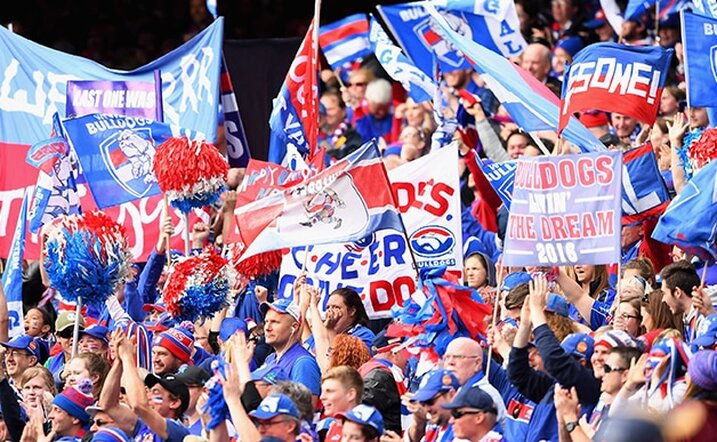 The week of tears It's Grand Final Week, and our Western Bulldogs' story has captured Melbourne. It's a dream that has swept and carried all neutral fans in a tidal wave of emotion and good will. There's hardly a mention of our opponents, the worthy but dull Sydney Swans. We're a fable, an allegory, the good guys who everyone wants to win. Our tale, our quest, are the very definition of 'quixotic.' I know because I looked it up in the dictionary: Caught up in the romance of noble deeds and the pursuit of unreachable goals; idealistic without regard to practicality. And yet in this happiest of weeks, all I can do is cry. I shed tears, whenever I saw the words 'Bulldogs' and 'Grand Final' in the same sentence. And without the usual qualifying words, 1961 or 1954. Or 'never'. Tears, whenever I view again the incredibly moving footage of our fans during the last, desperately tense minutes of the Preliminary Final against the Acronyms. I recognise myself in every frame. Unable to watch, having to watch. Unable to hope, but needing to hope. Tears, when I see pictures of the Bulldogs' logo being painted on the MCG turf, or the famous arena lit up with our colours - at last - in the build-up to that match, the party from which we have been excluded for so long. And finally it's Grand Final Eve. We, our beloved but luckless club with the most patient of fans, will be proudly on display in the Parade. That happy celebration, that window of opportunity when for both clubs, everything is still magically possible. Making my way to meet the Other Libber Sister and set off for the big occasion, tears fall again as I drive down Barkly Street, seeing the African restaurants in Barkly Street, flying our colours, displaying their 'WOOF WOOF' signs. Footscray, the suburb where my father was born, has become unrecognisable to me these days, vibrantly multicultural, unexpectedly hip. In fact, the street in which Dad grew up was even spruiked by real estate agents recently as having a 'Paris end' (which may perplex those who've ever visited the Champs-Elysees). Houses in the suburb everyone used to scorn and deride now sell for a million bucks. And the new generation of young professionals, who've brought soy lattes and avocado smash to trendy cafe menus, now call West Footscray, where my parents married and I myself was christened (all in the right Catholic order of course, in case you're wondering) - WeFo. The Libbers are catching the train from West Footscray. Even Metro have entered into the spirit, blaring out our song from the speakers as we do battle with the Myki machine. The platform sparkles with our red, white and blue colours: there are faded, hand-knitted scarves and retro bomber jackets from the 80s dragged out from cupboards and worn with pride. There's a resurgence, I feel, of the fierce Footscray and western suburbs' parochialism that I'd thought might have disappeared in our more urbane and cosmopolitan city. I see craggy faces who look like they've been through a lot, and faces from many places across the sea who've made the west their home. Babies are asleep nestled in their mothers' arms. Children aren't the only ones wearing face-paint, tri-coloured wigs, red white and blue nail art and hats with badges. When I turn my face to hide those treacherous tears again, I see the Olympic Tyres and Rubber factory - or what's left of it now that it's been converted to sleek new apartments. Here, both my parents and grandparents once worked. When I was granted the long-awaited privilege of attending games when I was four, we often waved to my grandfather, in his grey dust-coat, who was the gateman there, as we headed to the game. |
About the Bulldog TragicianThe Tragician blog began in 2013 as a way of recording what it is like to barrack for a perennially unsuccessful team - the AFL team, the Western Bulldogs. Categories
All
Archives
August 2023
|
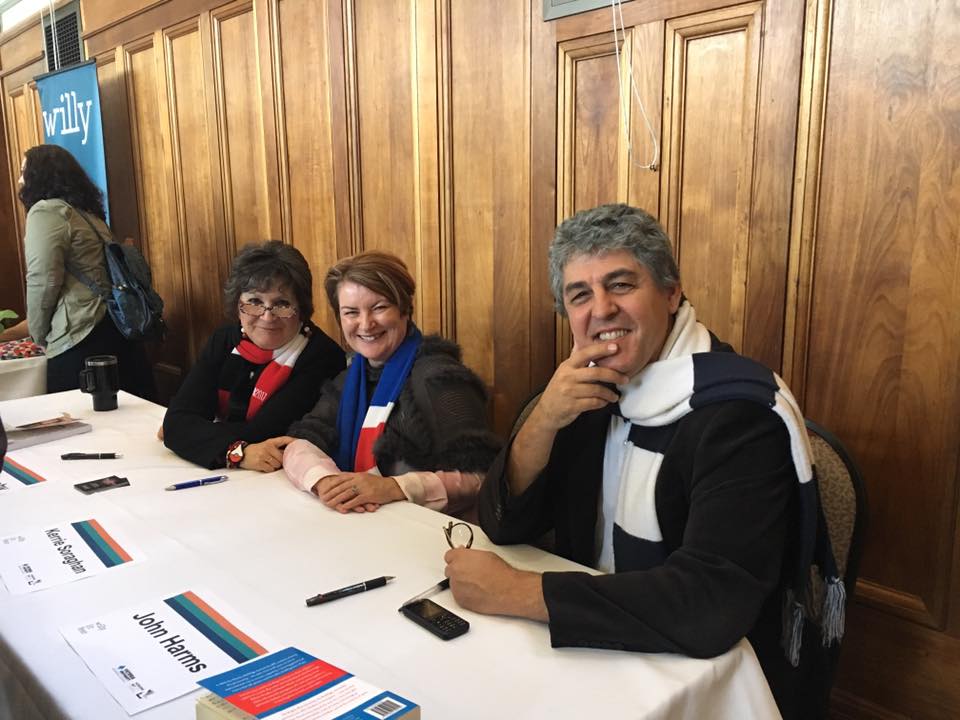
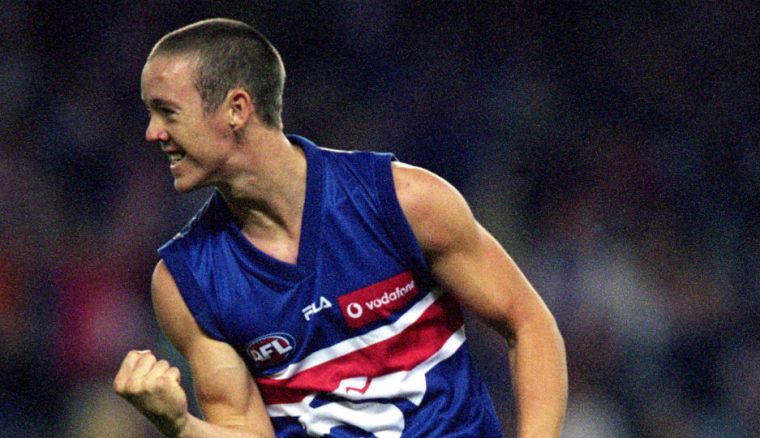
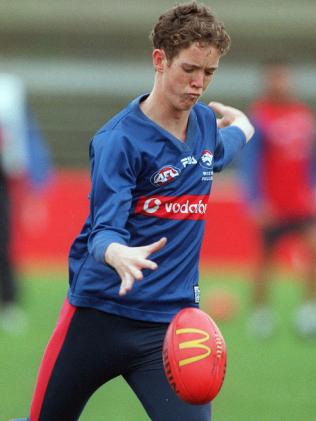
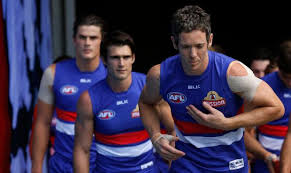
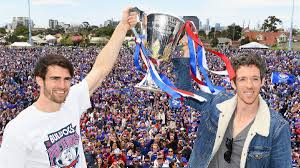
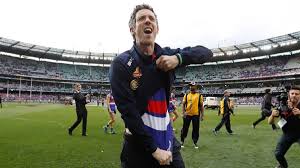
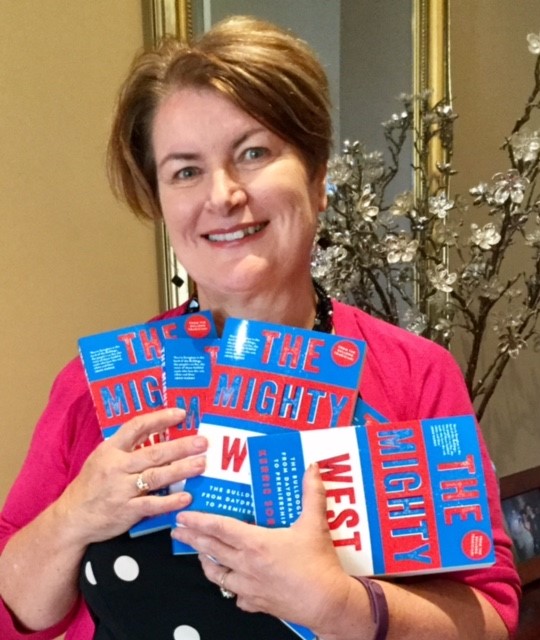
 RSS Feed
RSS Feed